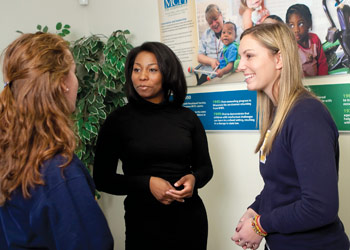The Service Learning Program boasts a variety of stories from community partners, faculty members and students about how service learning transforms classrooms and the community. Below are recent stories about the power of service learning:
Milwaukee Tutoring Program Finds Success with Burmese refugees
Myanmar Learning Center, a Service Learning Program community partner, was recently highlighted by the Milwaukee Journal Sentinel for their work tutoring Burmese refugees. Check out the Journal Sentinel article here.
Local Collaboration, International Impact
Students in Dr. Alex Milovic's marketing class work on a service learning project in partnership with Global Partners: Running Waters, a Milwaukee-based nonprofit organization working to provide clean water and improve quality of life for communities in Latin America. Read the Marquette Today article here.
The community engaged classroom: How Marquette is building a foundation of service for future generations
A new first-year classroom experience teaches the importance of building a community connection while laying a foundation for a lifetime of service. Read the Marquette Today article here.
Possibility Thinking in the Community-Engaged Classroom: Uniting Hope and Imagination towards Anti-Racist Action
Drs. Lilly Campbell and Jenna Green, faculty members in the Department of English, in collaboration with faculty from Fairfield University and Saint Louis University co-authored an article in Jesuit Higher Education: A Journal, looking at "the contribution that 'possibility thinking' makes to community-engaged learning" at their respective universities. Read the journal article here.
Reporting for Change
A new course in the Diederich College of Communication examines how inclusive storytelling can be used as an instrument for justice. Read the Marquette Today article here.
